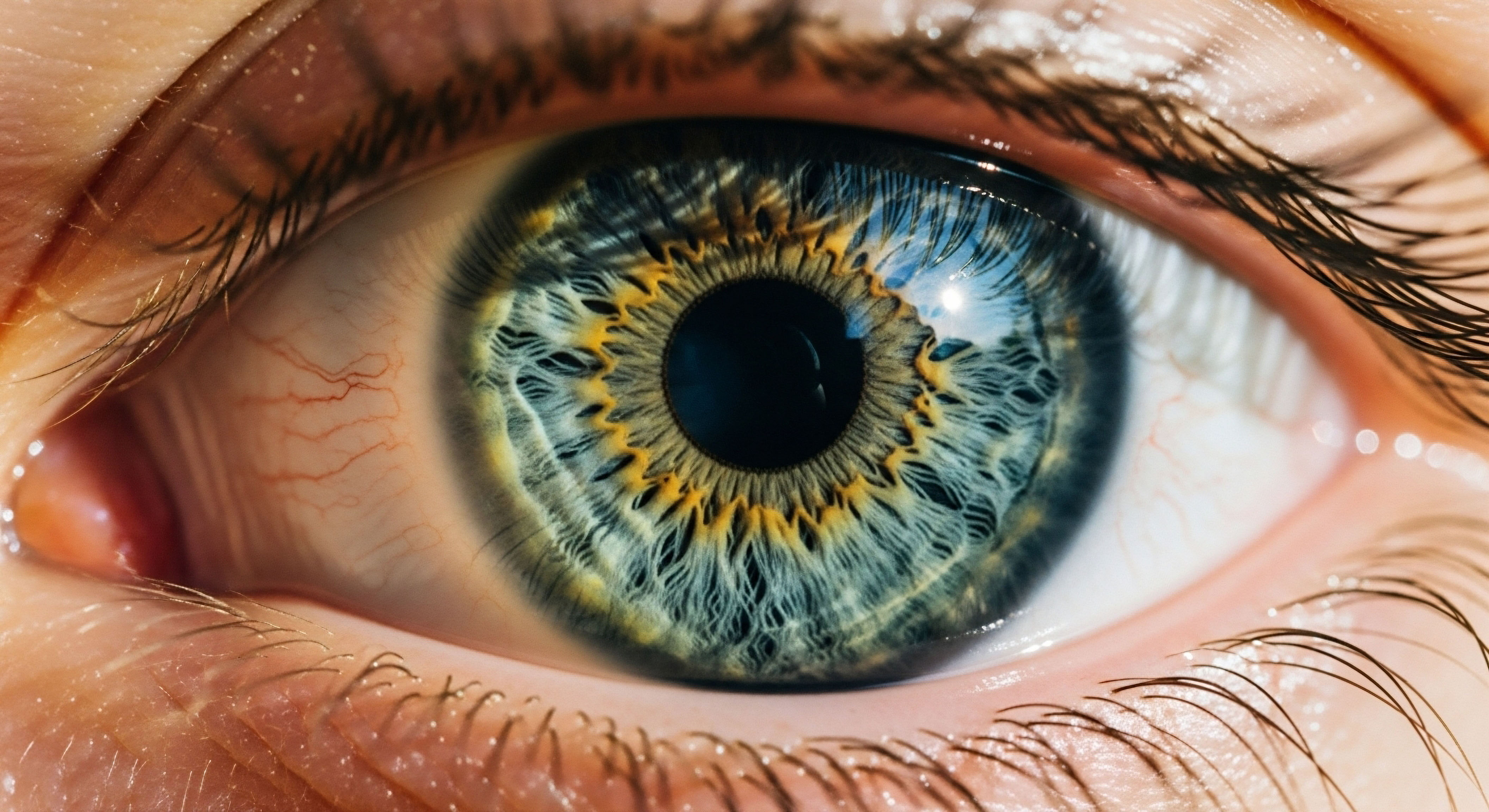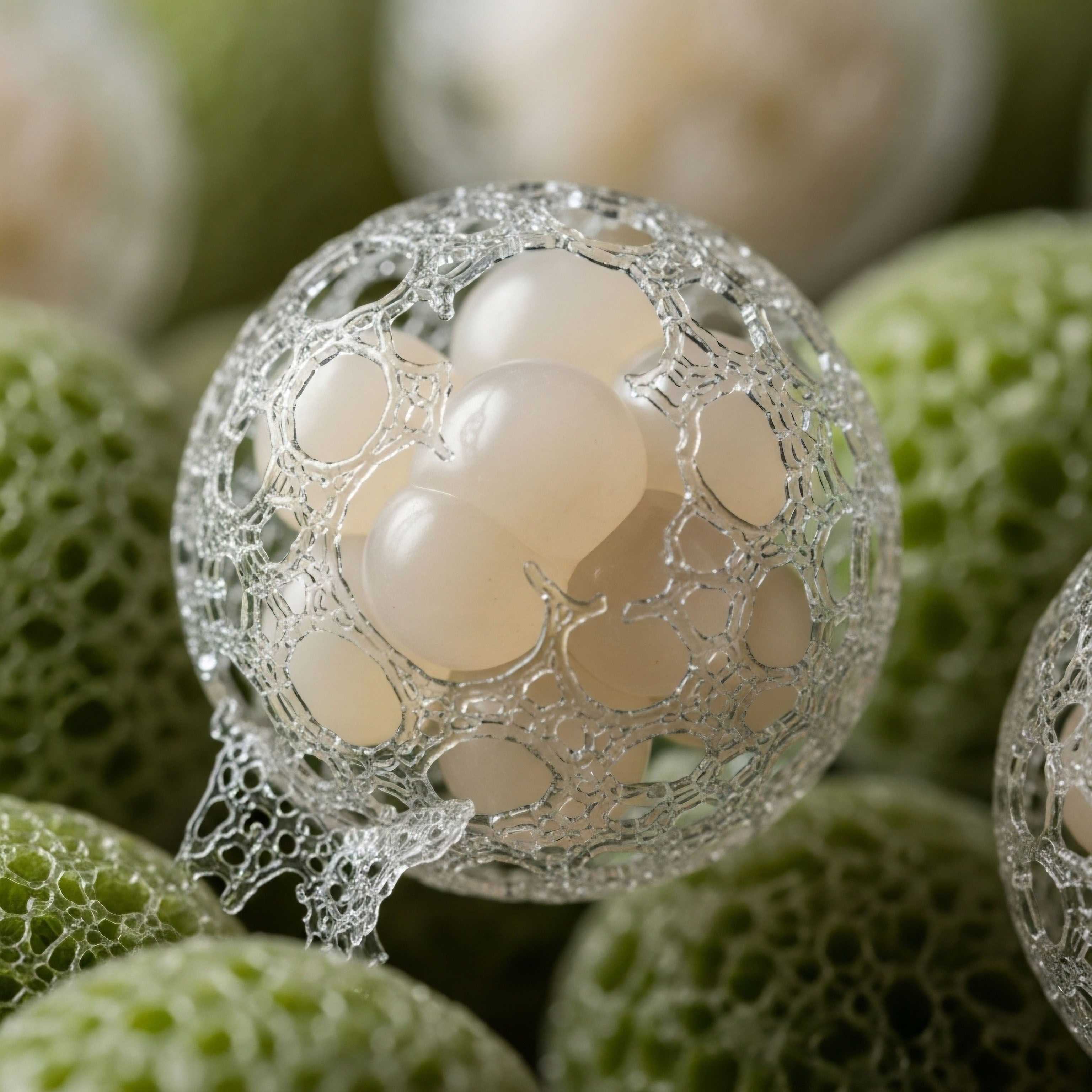

Fundamentals
You may have noticed changes in your body, a subtle slowing down or a shift in your overall vitality, and wondered about the internal mechanisms governing these feelings. These experiences are often linked to the intricate communication network of your endocrine system.
When we consider supporting this system through hormonal optimization, a common and valid question arises about the effects on other vital organs, specifically the kidneys. Your kidneys are sophisticated filtration systems, tirelessly working to cleanse your blood. Understanding how hormonal recalibration influences their long-term health is a foundational step in making informed decisions about your personal wellness journey.
The conversation around hormone therapy and kidney health is one of dynamic interaction. Hormones act as powerful signaling molecules that influence nearly every bodily function, including renal blood flow, the filtration of waste products, and the maintenance of electrolyte balance. For men with low testosterone, restoring levels can have a measurable impact.
Some research suggests that long-term testosterone therapy in hypogonadal men can lead to improvements in markers of renal function. This is often observed through changes in glomerular filtration rate (GFR), which is a key indicator of how well your kidneys are working. An increase in GFR suggests the kidneys are filtering blood more effectively.
Understanding the interplay between hormones and renal health is central to a comprehensive wellness strategy.
For women, the hormonal landscape is different, with estrogen playing a significant role in renal protection. Estrogen is understood to have a favorable influence on the progression of some chronic renal diseases, helping to attenuate certain types of kidney damage. The relationship is complex, as the decline in estrogen during menopause can alter this protective effect.
The dialogue surrounding hormone therapy in women must account for these hormonal shifts and their specific impact on kidney physiology. The goal of any therapeutic protocol is to work in concert with the body’s innate systems, supporting organ function rather than burdening it.
Ultimately, the connection between hormonal balance and kidney wellness is deeply personal. It involves looking at your individual health markers, understanding your body’s unique needs, and recognizing that optimizing one system can have cascading effects on others. The journey begins with appreciating the profound interconnectedness of your internal environment and seeking clarity on how to best support its lifelong function.


Intermediate
Moving beyond foundational concepts, a more detailed examination of specific hormonal optimization protocols reveals the precise mechanisms through which they influence renal function. The clinical application of testosterone, estrogen, and certain peptides involves carefully calibrated interventions designed to restore physiological balance. The effects on the kidneys are a direct result of how these molecules interact with renal tissues and the broader cardiovascular system.

Testosterone Therapy and Renal Parameters
For men undergoing Testosterone Replacement Therapy (TRT), particularly with weekly injections of Testosterone Cypionate, the observed effects on the kidneys are often linked to improvements in overall metabolic health. Conditions like obesity and hypertension, which are components of metabolic syndrome, place significant strain on the kidneys.
By improving body composition and glycemic control, TRT can indirectly alleviate this burden. Directly, testosterone has been shown to influence the reabsorption of substances like uric acid in the kidneys. Long-term studies have noted a decrease in serum creatinine, uric acid, and urea in men receiving testosterone therapy, alongside an increase in GFR. These changes collectively point toward improved renal efficiency.
The protocols often include medications like Gonadorelin to maintain testicular function and Anastrozole to manage estrogen levels. This comprehensive approach ensures that the endocrine system remains in a state of balance, which is essential for observing beneficial outcomes in other systems, including the renal system. Untreated hypogonadism, in contrast, has been associated with a gradual decline in renal function over time, highlighting the importance of maintaining hormonal homeostasis.
Specific hormonal protocols are designed to create systemic benefits, which often include the enhancement of renal efficiency.

Estrogen’s Role in Female Renal Health
In women, the application of hormone therapy, whether it involves low-dose Testosterone Cypionate, Progesterone, or pellet therapy, must consider the powerful influence of estrogen. Estrogen receptors are present in kidney cells, and through these receptors, estrogen exerts a protective effect, mitigating processes like glomerulosclerosis and tubulointerstitial fibrosis.
This makes estrogen a key player in preserving kidney structure and function. As women transition through perimenopause and post-menopause, the natural decline in estrogen can leave the kidneys more vulnerable to damage, particularly from conditions like high blood pressure.
However, the duration and type of estrogen therapy are important variables. Some research using animal models has suggested that very long-term estrogen administration post-menopause could potentially have negative effects, underscoring the need for personalized protocols that are medically supervised and tailored to the individual’s health status. The goal is to supplement declining hormones to a degree that maintains their protective benefits without creating adverse effects.
- Testosterone Therapy (Men) ∞ Studies have shown that long-term TRT in hypogonadal men can lead to a reduction in serum creatinine and uric acid, and an increase in GFR, suggesting a beneficial impact on kidney function.
- Estrogen’s Influence (Women) ∞ Estrogen is generally considered nephroprotective, with its decline during menopause potentially increasing the risk for renal issues. Hormone therapy aims to mitigate this risk.
- Metabolic Improvements ∞ Both male and female hormone optimization can improve metabolic factors like insulin sensitivity and blood pressure, which indirectly reduces long-term strain on the kidneys.
| Hormone/Therapy | Effect on GFR | Effect on Creatinine/Uric Acid | Primary Mechanism |
|---|---|---|---|
| Testosterone (in hypogonadal men) | Increase | Decrease | Direct effects on tubular reabsorption and indirect benefits via improved metabolic health. |
| Estrogen | Protective/Stable | Protective/Stable | Attenuates fibrosis and glomerulosclerosis through receptor-mediated actions. |


Academic
A sophisticated analysis of the long-term effects of hormonal optimization on renal function requires an examination of the cellular and hemodynamic mechanisms at play. The kidneys are not passive filters; they are dynamic organs with their own endocrine functions and are highly responsive to systemic hormonal signals. The influence of therapies involving testosterone, estrogen, and growth hormone secretagogues extends to the level of the glomerulus, the renal tubules, and the intrarenal vascular system.

Androgen and Estrogen Receptor Actions in the Nephron
The effects of testosterone on the kidney are mediated in part by androgen receptors located on the afferent arterioles, the small arteries that supply blood to the glomeruli. The activation of these receptors can influence renal blood flow and glomerular filtration pressure.
While some animal studies have raised concerns about testosterone-induced glomerular damage, multiple long-term observational studies in hypogonadal men undergoing TRT have reported favorable outcomes. These studies show improved GFR and reduced levels of waste products, suggesting that normalizing testosterone levels in a deficient state enhances renal hemodynamics and function. This may be partly attributable to testosterone’s effect on downregulating the GLUT9 transporter, which impacts uric acid handling.
Estrogen’s nephroprotective qualities are well-documented at a molecular level. Estrogen receptors, particularly ERα and ERβ, are expressed throughout the nephron. Activation of these receptors has been shown to reduce oxidative stress, decrease inflammation, and inhibit the proliferation of mesangial cells and fibroblasts, which are key drivers of glomerulosclerosis and interstitial fibrosis. Consequently, the hormonal changes of menopause can lead to an acceleration of age-related renal decline, a process that carefully managed hormone therapy may attenuate.
Hormonal influence on the kidney is a complex process involving receptor-mediated signaling that affects everything from blood flow to cellular health.

Growth Hormone Peptides and Renal Physiology
Growth hormone (GH) and its primary mediator, insulin-like growth factor-1 (IGF-1), also have significant effects on the kidneys. Growth hormone secretagogue peptides like Ipamorelin, Sermorelin, and Tesamorelin are designed to stimulate the body’s own production of GH in a pulsatile manner, mimicking natural physiological rhythms.
GH and IGF-1 receptors are abundant in the kidneys, and their activation influences renal size, blood flow, and glomerular filtration. In states of GH deficiency, renal function can be compromised. Therapeutic use of GH secretagogues can increase GFR.
It is important to distinguish this from conditions of pathological GH excess, such as acromegaly, where sustained high levels of GH can lead to renal hypertrophy and hyperfiltration, potentially causing long-term damage. The use of peptides aims to restore youthful GH levels, not create a state of excess.

What Are the Regulatory Considerations for Hormone Therapies in China?
The regulatory landscape for hormonal therapies varies globally. In China, the National Medical Products Administration (NMPA) oversees the approval and regulation of pharmaceuticals. While many core components of hormone replacement therapy are available, specific protocols and the use of certain peptides might fall under different regulatory categories. The legal framework for prescribing and importing substances like Gonadorelin or advanced peptides such as CJC-1295/Ipamorelin would require careful review of current NMPA guidelines to ensure compliance for both clinicians and patients.
| Hormone/Peptide | Target Cells/Receptors | Primary Cellular Effect | Observed Physiological Outcome |
|---|---|---|---|
| Testosterone | Afferent arteriole cells, tubular cells (Androgen Receptors) | Modulation of vascular tone; regulation of transporter proteins (e.g. GLUT9). | Improved GFR and waste clearance in hypogonadal men. |
| Estrogen | Glomerular, mesangial, and tubular cells (ERα, ERβ) | Anti-fibrotic, anti-inflammatory, and anti-oxidative effects. | Preservation of renal structure and function. |
| GH/IGF-1 (via Peptides) | Glomerular and tubular cells (GH/IGF-1 Receptors) | Stimulation of renal blood flow and glomerular filtration. | Increase in GFR. |
The existing body of research indicates that hormone optimization, when conducted within physiological ranges to correct deficiencies, generally supports or improves renal function. The key is a personalized, medically supervised approach that respects the body’s intricate feedback loops.

References
- Al-Zoubi, R. M. et al. “The impact of long-term Testosterone Therapy (TTh) in renal function (RF) among hypogonadal men ∞ An observational cohort study.” The Aging Male, vol. 24, no. 1, 2021, pp. 123-131.
- Yassin, Ayman, et al. “Long-Term Testosterone Treatment Improves Fatty Liver and Kidney Function with Safe Outcomes on Cardio-, Metabolic and Prostate Health in Men with Hypogonadism.” Journal of Clinical Medicine, vol. 9, no. 12, 2020, p. 3853.
- Yassin, A. et al. “Long-term Testosterone Therapy Improves Renal Function in Men with Hypogonadism ∞ A Real-life Prospective Controlled Registry.” Journal of Clinical Nephrology and Research, vol. 7, no. 1, 2020, p. 1095.
- Cea-Calvo, L. et al. “Sex differences in the association between classic risk factors and the incidence of chronic kidney disease in a Spanish cohort.” Kidney and Blood Pressure Research, vol. 42, no. 4, 2017, pp. 714-726.
- Kang, D. H. et al. “The role of testosterone in the pathogenesis of renal disease.” Journal of the American Society of Nephrology, vol. 13, no. 9, 2002, pp. 2384-2391.
- Bădărău, S. and M. C. Rugină. “Chronic kidney disease and the involvement of estrogen hormones in its pathogenesis and progression.” Revista Medico-Chirurgicala a Societatii de Medici si Naturalisti din Iasi, vol. 118, no. 2, 2014, pp. 343-9.
- Dou, X. et al. “Estrogen and estrogen receptors in kidney diseases.” Kidney Diseases, vol. 7, no. 4, 2021, pp. 266-282.
- American Physiological Society. “Long-term use of postmenopausal estrogen treatment may impair kidney function.” ScienceDaily, 29 Nov. 2016.
- Rabkin, R. and Z. Sun. “Growth hormone axis in chronic kidney disease.” Pediatric Nephrology, vol. 23, no. 1, 2008, pp. 15-22.
- Haffner, D. and O. Mehls. “Renal effects of growth hormone in health and in kidney disease.” Pediatric Nephrology, vol. 32, no. 5, 2017, pp. 753-763.

Reflection
Having explored the intricate connections between your endocrine system and your kidneys, the path forward becomes one of personalized vigilance and proactive partnership with your health. The data and mechanisms discussed here provide a map, yet you are the unique territory it describes.
Your personal health narrative, your lab results, and your subjective sense of well-being are the critical data points that give this scientific information its true meaning. The knowledge you have gained is the first, most important step. The next is to consider how this information applies to your own biological systems and to continue asking questions, seeking clarity, and moving toward a state of vitality that is authentically yours.



